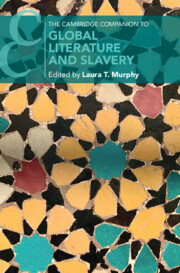Book contents
- The Cambridge Companion to Global Literature and Slavery
- The Cambridge Companion to Global Literature and Slavery
- Copyright page
- Contents
- Contributors
- Acknowledgments
- Chronology
- Introduction
- Part I Contexts and Contestation
- Part II Forms and Figures
- Part III Legacies and Afterlives
- Part IV Metaphors and Migrations
- Chapter 12 Itineraries of Arabic across Oceans and Continents
- Chapter 13 Apartheid’s Ghosts
- Chapter 14 African Boat Narratives, Disposable Bodies, and the New Native Survivor
- Chapter 15 Mediterranean Afterlives of Slavery
- Further Reading
- Index
- Cambridge Companions To …
Chapter 13 - Apartheid’s Ghosts
Slavery in the Literary Imagination
from Part IV - Metaphors and Migrations
Published online by Cambridge University Press: 15 December 2022
- The Cambridge Companion to Global Literature and Slavery
- The Cambridge Companion to Global Literature and Slavery
- Copyright page
- Contents
- Contributors
- Acknowledgments
- Chronology
- Introduction
- Part I Contexts and Contestation
- Part II Forms and Figures
- Part III Legacies and Afterlives
- Part IV Metaphors and Migrations
- Chapter 12 Itineraries of Arabic across Oceans and Continents
- Chapter 13 Apartheid’s Ghosts
- Chapter 14 African Boat Narratives, Disposable Bodies, and the New Native Survivor
- Chapter 15 Mediterranean Afterlives of Slavery
- Further Reading
- Index
- Cambridge Companions To …
Summary
Mapping one of the “global afterlives of slavery,” this chapter thinks about how the racist technologies of control in the United States, from slavery to Jim Crow Segregation, formed templates for other racist configurations of control across the colonial world. Charting the transatlantic reach of white supremacy transmitted through ecosystems of transcolonial influence, the chapter explores what it means to think about the legacies, or “afterlives,” of the policies and ideological structures that emanated from the histories of slavery in the southern United States, and how these traveled as markers of both precedent and caution to other nations, and especially in the case of South Africa. As a transnational afterlife to the histories of slavery in the United States, apartheid can be seen to grapple with the legacies of racial control such as segregation, employing the racialized landscapes of the post-slavery American south as metrics and templates for the articulation of segregationist platform that would lead to formal apartheid by the mid-twentieth century. The chapter argues that while slavery did not create apartheid, the transcolonial circulation of technologies of racial control did mutually inform and structure the national and cultural landscapes of spaces such as the American south and South Africa.
- Type
- Chapter
- Information
- The Cambridge Companion to Global Literature and Slavery , pp. 219 - 234Publisher: Cambridge University PressPrint publication year: 2022

